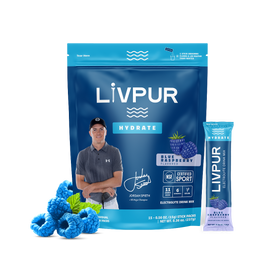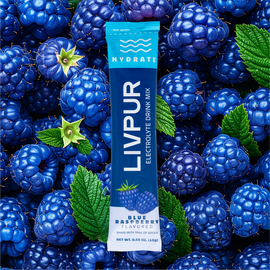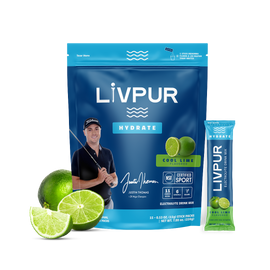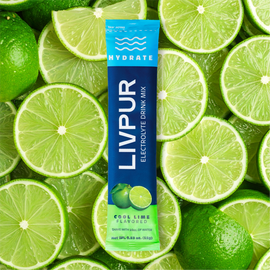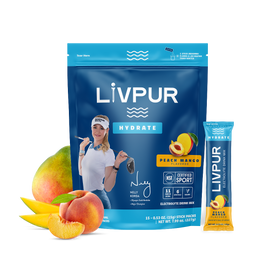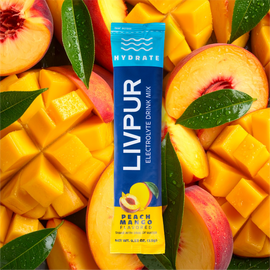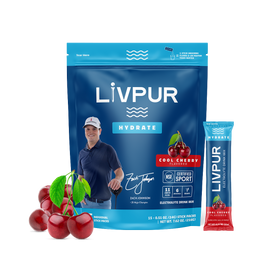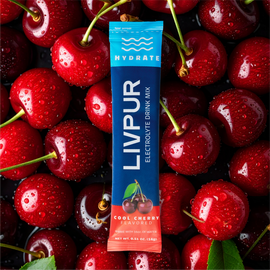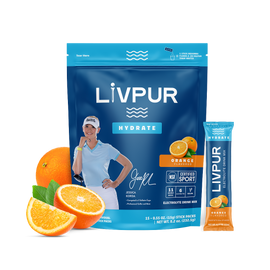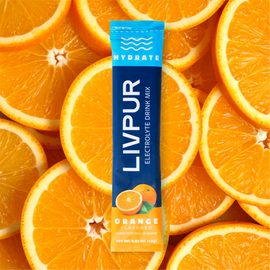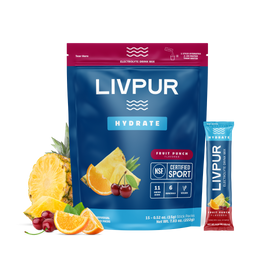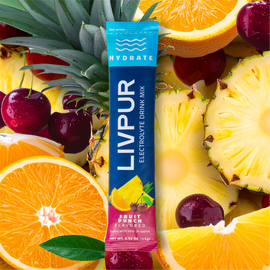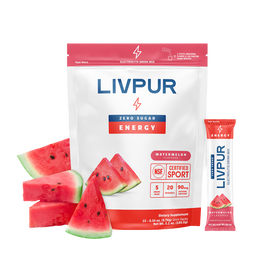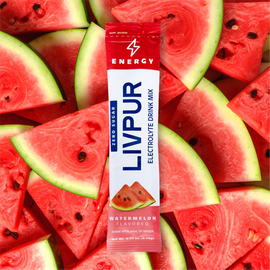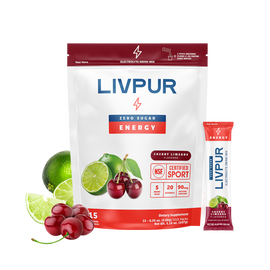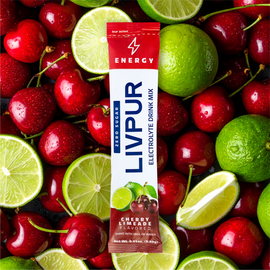November 13, 2025 • By Katie Switow • Blog
Common Electrolyte Myths, Debunked

Hydration gets kind of controversial faster than it should... we all have one friend who swears by sports drinks, but sources online say that drinking water is all you really need! At the end of the day, we all just want to get healthy hydration, so what gives with all these myths?
At LIVPUR, our hydration plan is simple. Daily fluid intake starts with plain water, then scales based on the physical activity you actually do (and we're not just talking about exercise today!) When the weather turns sticky and especially as we're heading into cold and flu season, your body benefits in many ways from replenishing electrolytes (particularly sodium ) so that your nerve and muscle function are steady. We've also found that our delicious Hydrate flavors help us stay hydrated when plain old water gets boring!
If you like easy wins, start with Hydrate for proper fluid balance on busy days, hot or humid conditions, and long workouts. It is a clean way to maintain electrolyte balance without excess sugar. Prefer a steady energy increase? Our Energy formula pairs natural caffeine with L-theanine for smooth focus that plays nicely with a thoughtful hydration routine.
Now, let’s set the record straight around some of the most common electrolyte myths we hear ALL THE TIME!
Myth 1: “Only serious athletes need to worry about electrolytes.”
Real life drains your electrolytes almost as fast as exercise. With the late summer heat waves flipping your fluid and mineral balance fast. Oral rehydration solutions exist for exactly this reason, pairing sodium with a low dose of glucose (just like we included 3g of glucose in LIVPUR Hydrate) to make sure that the water you drink is truly absorbed efficiently in the small intestine.
Daily fluid intake is perceived as something that matters more than anything else when your overall physical activity is light, mostly because drinking fluids throughout the day helps maintain electrolyte balance when it's combined with a healthy diet. Hydrating foods like fresh fruits and leafy greens add natural electrolytes while you stay hydrated in a simple, low-effort way! However...
We're also putting a reminder here that you can check out our primer on finding balance with electrolytes if you want the basics in one place. Because even if you aren't a "serious" athlete, your body has serious electrolyte needs (and most people aren't fully delivering on those...)
Myth 2: “Plain water solves every scenario.”
Water is perfect for short effort days. But for any long or especially sweaty events, it can backfire if you only drink water. Exercise-associated hyponatremia is a real risk when fluid intake dilutes your blood sodium (again, the most important electrolyte during prolonged activity.)
The current international consensus includes the same practical approach we're recommending here, like drinking to match your thirst and pairing fluids/electrolytes to your conditional needs instead of prescriptivist rules.
For a deeper dive, we'd suggest reading our explainer on electrolyte imbalance science and how hydration links to overall health and recovery. There's so much to unpack here!
To get at the heart of it quickly...plain water is crucial for proper hydration, but extended periods of intense physical activity shift the target toward both fluid balance and your electrolyte levels. In those scenarios, a well-formulated sports drink can help maintain electrolyte balance while you drink water to thirst and avoid pushing levels dangerously low. German Journal of Sports Medicine
Myth 3: “Caffeine dehydrates you.”
Moderate caffeine is not the villain. In habitual coffee drinkers, coffee is shown to hydrate the human body about as well as water over a typical day, and the mild diuretic effect does not meaningfully impair hydration.
This is a huge myth that has plagued caffeine-enjoyers for years. Enough with it! Coffee, tea, and drinking water all count toward water intake when you aim to stay hydrated throughout the day. And that's not our word; it's been well documented by the National Library of Medicine.
Myth 4: “Salt tablets are the smartest shortcut.”
This is a bit of an older myth, but some people still remember the days when salt tablets were known as the universal cure-all for dehydration. Really, these are blunt instruments. Heat-safety guidance for workers specifically advises against routine salt tablet use because they can upset the stomach and overshoot sodium levels in the blood if not carefully monitored. Fluids plus food, or a balanced sports drink during strenuous exercise, work far better...
Replenishing electrolytes (which are much more complex than simple sodium) is our goal here at LIVPUR, not swallowing salt for its own sake.
Many sports drinks can make electrolyte replenishment easy during intense exercise, but check for added sugars or high fructose corn syrup which are often snuck in to give you a sort of perceived good feeling after you drink it. A measured sports drink, on the other hand, can replenish electrolytes lost while you keep fluid intake steady, which is a better way to stay hydrated than sugar bombs or salt tablets ever were.
Myth 5: “Cramps just mean you need to eat a banana or drink some pickle juice.”
Cramps are messy. Fatigue and neuromuscular factors drive a lot of them, with electrolytes only part of the picture. Pickle juice studies have recently shown that fast relief likely comes from a nerve reflex in the back of the throat rather than the mineral absorption itself. But that same study showed that pickle juice doesn't always work! So, it seems like you could be trying to fix a symptom rather than address the real cause if that's your solution. If muscle cramps keep showing up, we'll start to look at our training load (including the heat and choices like our pacing.)
Protect muscle function and nerve and muscle function by matching fluids and electrolytes to the physical activity you actually do, and watch for signs of electrolyte depletion late in long sessions! Bananas and pickle juice will only get you so far.
Myth 6: “Coconut water covers everything.”
Nice drink. But typical coconut water has less sodium than sweat, and heavy sweaters can lose electrolytes faster than coconut water replaces them. Controlled trials we've looked into show that coconut water can rehydrate similarly to a standard sports drink when you're at rest, but it does not erase a sodium gap during long, hot days or particularly intense workouts! We love to mix LIVPUR Energy or Hydrate in with some coconut water when we just crave that extra coconut flavor. Not a ton of benefit on its own, but the combination is a hydration machine.
Myth 7: “Sugar-free is always better.”
Glucose is not there for flavor alone, despite what the sports drinks might make you think. Your stomach has what's known as a "sodium-glucose co-transporter" which is what actually pulls water back into your body. But this only happens when sodium and glucose ride together (which is why our formulas include both!) If you want a super detailed look, we published our full NSF certifications that break down each ingredient to the tenth of a gram.
Myth 8: “Electrolyte drinks can raise my blood pressure.”
Chronic high sodium intake is a blood pressure problem; that is true. Daily nutrition guidelines encourage most adults to bring sodium down while bringing potassium up through food. That does not erase the separate case for targeted sodium during strenuous activity, though! If you're concerned about blood pressure, we always recommend talking to your doctor before adding something new to your diet.
Where LIVPUR Fits

We built our Hydrate formula specifically for replenishing electrolytes during long periods of physical activity, long travel days, and any time we needed a fast way to maintain electrolyte balance. Stemming from that success, we created our Energy formula that gives you a gentle lift with natural caffeine and L-theanine!
We hope this debunking guide helped you better understand daily hydration best practices and come up with a steady hydration routine for yourself. If you want more information on the science behind our products, take a look at our article on electrolyte imbalance science. Or, read our NSF certifications if you're interested in learning more about what it means to be upfront with your ingredients!
